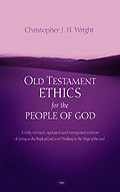 I had a very good time hearing Dr Chris Wright deliver three expository messages from Deuteronomy last week. Organised by KL Christian Conference & Evangel Book Center, I’m pleased to report that this annual Bible exposition continues to draw the crowds. The theme “Living as God’s People for the sake of God’s World” is appropriate in addressing the way churches tend to congregate in holy huddles, forgetting the larger context of their place in the world. Take for instance this church-goer who, a little puzzled, asked regarding Lina Joy’s legal battles: “What has it got to do with us? It doesn’t affect us, what?”
I had a very good time hearing Dr Chris Wright deliver three expository messages from Deuteronomy last week. Organised by KL Christian Conference & Evangel Book Center, I’m pleased to report that this annual Bible exposition continues to draw the crowds. The theme “Living as God’s People for the sake of God’s World” is appropriate in addressing the way churches tend to congregate in holy huddles, forgetting the larger context of their place in the world. Take for instance this church-goer who, a little puzzled, asked regarding Lina Joy’s legal battles: “What has it got to do with us? It doesn’t affect us, what?”This unfortunate trend is inimical to the counsel of Scripture and it was good to be reminded why it was so. The Christian has a responsibility in God's world and it is not merely in the realm of the faith and our own faith community. Elsewhere Dr Wright has put it this way:
"Old Testament ethics is going to be a social affair. It is not simply a compendium of moral teaching to enable the individuals to lead privately upright lives before God. Now, of course, this is not to deny that the Old Testament is deeply interested in the moral choices and behaviour of the individual. Many Old Testament laws, including the Ten Commandments, are framed in the second person singular, addressing the individual. But they are addressed to the individual as part of the community, and their purpose is not just individual uprightness but the moral and spiritual health of that whole community. For God's purpose, as we have seen, was not to invent a production line for righteous individuals, but to create a new community of people who in their social life would embody those qualities of righteousness, peace, justice and love which reflect God's own character and were God's original purpose for humanity.So the question of how to live as God’s people remains timely. It must be said however the ethical considerations of the OT are just as relevant for New Testament Christians because God's moral laws do not change with time. Where in the past God’s people referred to the Jews, in the present, it is God’s universal Church that is now tasked with proclaiming His redemptive purpose in word and deed. Having recently completed writing some assigned devotional readings from the first 12 chapters of Deuteronomy, I couldn’t help but mentally compare notes with the themes in Dr Wright’s messages. Back when I was writing, it was Raymond Brown’s commentary on Deuteronomy Not By Bread Alone that I turned to -which really covered similar ground.
"The relevance of our ‘social angle', then, is that when we seek to interpret the Old Testament text ethically we must not stop short at the question, 'what does this text say to me?' In fact we should not even start with that question. We must study the passage within its own social context in Old Testament Israel, asking how this text contributes to our understanding of the social and ethical life of Israel. What is its place in the total shape of that society? Then we might move on at a later stage to ask what it has to say within the present community of God's people, and then, further, what social implications it may have in human society at large. If we have energy left, then we will be faced with the challenge, 'so what kind of person must I be, and what kind of behaviour is required of me, if my life is to be shaped by, and consistent with, such a vision of God's purposes?' "[More]
Anyway, back to Deuteronomy. It also must be said that Christianity does not seek to impose OT laws or further a new kind of theocracy. As Jesus himself declared, his kingdom is not of this world. The OT emphasis on land especially takes on a different turn for Christians today. However, the intimate connection between identity and mission is not lessened and the Church needs to examine and reclaim it afresh.
Dr Wright’s earlier book God’s People in God’s Land: Family, Land and Property in the Old Testament stressed how the Church is heir to names and privileges of Israel as her ‘organic’ continuation. Except that now we live as a Messianic
 community – redeemed and transformed by Christ – placed in a different historical context, living out our ethical responsibilities beyond Israel’s ritualistic or cultic practices, yet bearing the same missional imperative. I like the fact that within the context of the Church, Dr Wright admits the centrality of the family – and particularly the father – as one OT focus that remains unchanged for our time.
community – redeemed and transformed by Christ – placed in a different historical context, living out our ethical responsibilities beyond Israel’s ritualistic or cultic practices, yet bearing the same missional imperative. I like the fact that within the context of the Church, Dr Wright admits the centrality of the family – and particularly the father – as one OT focus that remains unchanged for our time.Talking about books, I couldn’t help but pick up Dr Wright’s considerably revised Old Testament Ethics for the People of God. RM70 – that’s a bargain for a book by one of the foremost OT scholars of our day. Worth it, don't you think?
4 comments:
had to miss the conference. But Rev. Dr. Chris Wright did pop by to PD for the Lausanne Younger Leaders gathering and did a 4 minute video clip which gave those of us who take theological thinking seriously "hope" and "direction" looking forward to what will come out of the theology working group for Lausanne 3 in 2010.
Oh hi Sivin, did you say "4 min video clip"? So he didn't really visit. The outcome for Lausanne 3 is something I too would look out for. In which group are you participating, if you don't mind my asking?
Managed to come for Day 3 - excellent stuffs by Chris Wright, definitely a good investment in OT Ethics for the people of God :)
Got my copy for usd 20
RM70 was a bargain because the book was originally retailed at RM130+ I think. But looks like yours was an even better deal!
Post a Comment